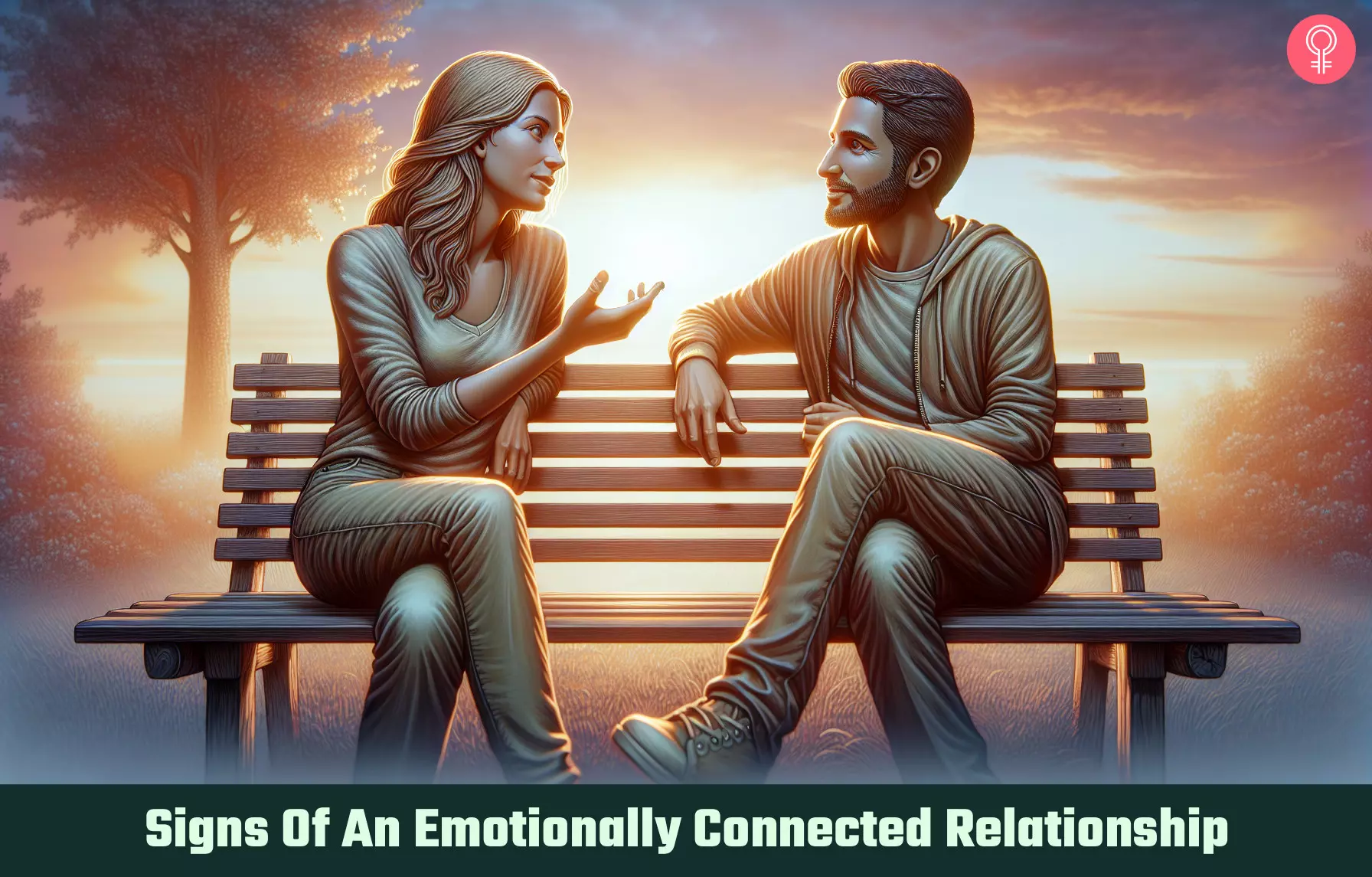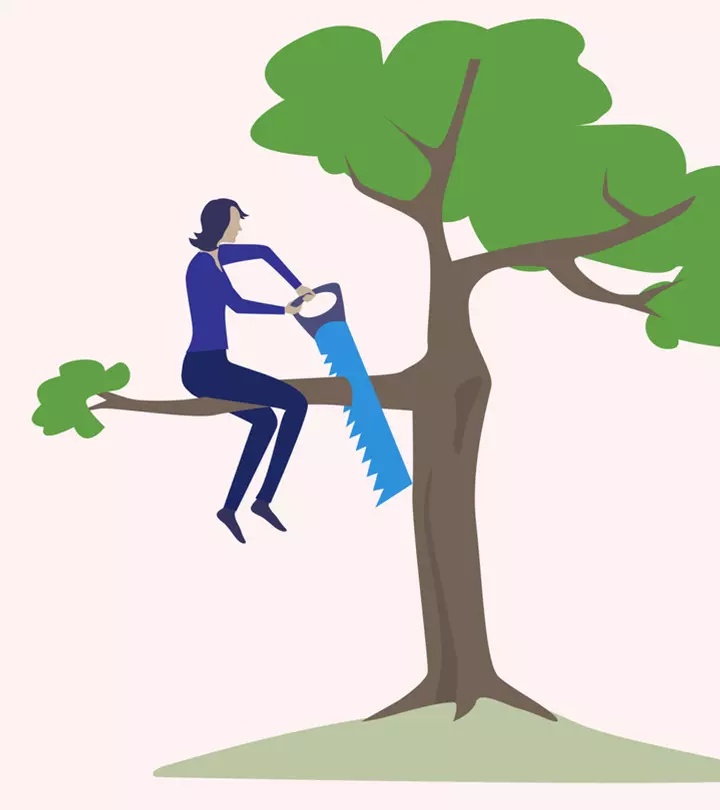15 Signs Of An Emotionally Connected Relationship
The subtle signs tell you that the waters run deep, and it's more than just a casual affair.

Image: Shutterstock
Emotional connection is a key factor that determines the foundation of healthy personal and intimate relationships. So, undoubtedly, it should be highly valued. However, even when we have everything else we need, a lack of emotional bonding and sentimentality can stand as a hurdle to joy and happiness in a relationship. If partners lose the emotional bond, a void is created that cannot be handled with expensive gifts or great gestures. Therefore, maintaining the connection emotionally is a major responsibility of both partners. The good news is you can always try building up the connection if you feel you are losing it. In this article, we have discussed some strategies to rebuild the lost emotional connection with your partner. While these strategies draw inspiration from expert-backed opinions and examples, they are not absolute. So make sure you keep an open mind when analyzing your relationship. Now, without further ado, scroll down to know more about clear signs of an emotionally connected relationship.

In This Article
What Is An Emotional Connection?
Everyone has their own idea of what an emotional connection means to them. Typically, an emotional connection is characterized by the following:
- A feeling of intimacy that goes beyond physical attraction.
- The ability to connect with the other person on a deeper level.
- The ability to feel secure while connecting emotionally with the other person.
- A feeling of belonging and general well-being with the other person.
All in all, emotional connection is not about having superficial conversations or banking on surface-level similarities to keep the relationship going. This connection is strengthened with mutual feelings of intimacy, trust, and understanding. It is about genuinely feeling a deep sense of attachment, respect, and care for the other person. As you can imagine, an intense emotional connection lays the foundation for long-term and real intimacy.
 Quick Tip
Quick TipNow, let us understand the top tell-tale signs of two emotionally connected people.
Key Takeaways
- Lack of emotional connection and support ruins the happiness in a relationship.
- Both partners should work towards building an emotional connection.
- If you are emotionally connected, you feel a deep sense of attachment, respect, and care for the other person.
- Such a connection helps you navigate your relationship.
Top 15 Signs That You Are Emotionally Connected To Your Partner
If you want to build a sustainable and happy relationship, being emotionally connected is key. Here are the signs of emotional connection:
1. You Both Genuinely Care For Each Other’s Needs, Wants, And Desires
One of the most defining characteristics of an emotional connection is when you want the best things in life for your partner.
In other words, you genuinely feel happy when their life goals, dream goals, career goals, etc., get fulfilled.
For instance, when your partner gets a promotion at work, you feel genuinely proud and excited for them, celebrating their hard work and achievements. You take the time to ask about their goals and offer encouragement, knowing how important this milestone is for them. Similarly, when it is your turn to chase a personal goal, whether it is starting a new hobby or achieving a fitness milestone, your partner is right there by your side, supporting you every step of the way. Your happiness is intertwined, and you both feel joy when the other person succeeds, fostering a deep emotional bond based on mutual care and respect.
2. You Support And Champion Each Other

When it comes to building a rock-solid emotional connection, genuine support is of utmost importance (1). This support can be physical, emotional, or mental, depending on the state of each individual.
For instance, when your partner decides to pursue a new career path, you are right there cheering them on. You help them research potential job opportunities, encourage them to step out of their comfort zone, and celebrate each milestone along the way. In return, when you face a personal challenge, your partner stands by your side, offering words of encouragement and practical support, like helping you organize your thoughts or offering a comforting presence. This mutual support strengthens your emotional connection.
3. You Engage In Honest And Open Conversations

Are you both regularly having honest conversations about the relationship and life in general, despite differing opinions? If so, you are in an emotionally sound relationship.
For example, during dinner, you and your partner talk openly about your plans for the future, even if your views sometimes differ. Maybe you have different ideas about where to live, but instead of avoiding the topic, you both discuss your thoughts honestly, considering each other’s desires and finding common ground. Even when disagreements arise, there is a sense of respect and understanding. You both value honest communication, knowing that these open conversations help strengthen your emotional connection and ensure you are always on the same page.
4. You Re-Evaluate Your Relationship From Time To Time
Emotionally connected partners are often internalizing the relationship and figuring out where things can be better.
There is little to no hesitation in truly speaking your mind.
Take this for example — every few months, you and your partner sit down for an open and honest conversation about how your relationship is evolving. You talk about what is working well and areas where you both feel improvements can be made. Perhaps, you discuss how to better balance your individual needs with your shared goals, or how to handle stress in healthier ways. This ongoing process of re-evaluation allows both of you to voice any concerns and celebrate the successes, ensuring that the relationship continues to grow stronger with time. This transparency fosters a deeper emotional connection as both partners are committed to constant self-improvement and mutual understanding.
5. You Actively Listen To Each Other
It is one thing to simply hear what the other person is saying and a whole different ball game altogether to engage in active listening. This includes:
- Creating a safe space for the partner to vent out and air their concerns without any fear of judgment or any kind of negativity.
- Genuinely being present and devoting your complete attention to what your partner is saying.
- Demonstrating active listening through eye contact and head nods.
For instance, when your partner starts sharing a difficult experience at work, you put down your phone, turn off distractions, and give them your full attention. You make sure to maintain eye contact and nod along, signaling that you are fully engaged. As they speak, you do not interrupt but ask thoughtful follow-up questions to show you understand their feelings. You allow them to vent, offering a safe, non-judgmental space where they can express themselves freely. This type of active listening, where you are truly present, not only strengthens communication but deepens the emotional connection between you both.
6. You Know Each Other’s Ins And Outs
From knowing and accepting each other’s flaws to deeply understanding each other’s personality, emotionally connected people are aware of every little detail that makes up their partner.
This includes knowing their fears, motivations, values, dreams, vulnerabilities, and insecurities.
For example, your partner knows that when you are stressed, you prefer to be left alone for a bit to decompress, and they respect that space without taking it personally. They also understand that your greatest fear is failure, so when you face challenges at work, they offer words of encouragement rather than pushing you to overachieve. Likewise, you know their passion for helping others stems from a deep sense of empathy, and you make an effort to support their charitable endeavors. By understanding and embracing each other’s quirks, fears, and aspirations, you create a profound emotional connection that allows both of you to feel seen and valued for who you truly are.
7. You Voluntarily Participate In Each Other’s Hobbies

Partners with a strong emotional connection willingly go the extra mile to accommodate the other person’s interests and hobbies into their routine to spend more quality time together. The idea is to find ways to reconnect with the other person and build rapport, either through shared interests or differing hobbies.
Say, your partner loves photography, so you join them on a weekend hike, even though you are not particularly interested in capturing photos. You enjoy the walk, help them find great spots for pictures, and show enthusiasm for their hobby by asking about the best techniques. In turn, they take an interest in your passion for painting, offering to help set up your easel and chatting about colors and techniques as you work. These shared moments, where you actively participate in each other’s hobbies, help you grow closer.
8. You Liven Up The Relationship With Attention To Detail

If your relationship is more about celebrating the smaller joys of everyday life, it means that you are emotionally tuned into each other. You understand that it is the smaller things and gestures in life that bring about the maximum amount of joy. These small things could include:
- Cooking for each other
- Taking an interest in the mundane details of each other’s lives
- Taking care of each other when sick
- Surprising each other at work with date-night plans
All in all, if you both are invested in each other’s day-to-day life, it is a good sign.
Imagine this; one morning, you surprise your partner with their favorite breakfast, knowing they have had a late night and could use the extra comfort. Later, when they mention a minor detail about their work, you remember it and ask how it went, showing genuine interest in their day. When they feel under the weather, you are quick to offer comforting tea and care, ensuring they have everything they need. These small acts, caring for each other in everyday moments, bring a sense of warmth and connection.
9. You Are Not Focused On “Fixing” Each Other
Emotionally mature couples understand that they do not need to “fix” the other person or get into the problem-solving mode to eliminate issues.
It is all about giving the other person healthy space to speak out and simply listen to their problems without judgment or being condescending.
For instance, after a challenging day, your partner vents about their frustrations, and instead of jumping in with solutions, you simply listen. You let them express their feelings without rushing to fix the situation or offer advice unless asked. Your presence alone is enough to make them feel heard and understood. This creates a safe space for them to be vulnerable, knowing that you are there to support them, not to correct or solve their problems. By giving each other the freedom to speak openly without judgment, you strengthen your emotional bond and foster deeper trust.
Jay Shetty, host of a popular podcast, engages in discussions with his wife about love and relationships. He emphasizes, “I feel like you actually move closer away by forcing yourself together when actually you could move closer together by allowing yourselves to have that space (i).”
10. You Are Sympathetic And Empathetic Towards Each Other
You may be on opposite poles of the spectrum mentally, but you both get where the other person is coming from. Understanding each other’s perspective is a healthy sign of emotionally connected couples and demonstrates true care and concern for the partner. Also, if both of you are putting in equal effort to make the relationship thrive, you have a strong emotional connection.
Here is an example: After a tough day at work, you come home feeling drained and overwhelmed. Your partner, despite having had a stressful day, immediately notices your mood. They do not just brush it off but take a moment to ask how you are feeling and listen to your frustrations without offering unsolicited advice. Similarly, when your partner faces challenges, you take the time to truly understand their feelings and offer comfort. Both of you consistently put in the effort to be there for each other, emotionally supporting one another through both the highs and lows. This mutual empathy strengthens your bond, showing that you are deeply connected.
11. You Do Not Hide Your Quirks
If you can openly indulge in your most embarrassing and strange habits in front of your partner, congratulations – you are in an emotionally mature relationship as you can only do so if there is no fear of judgment or embarrassment.
Imagine a scenario where you are at home, lounging on the couch, and your partner catches you humming your favorite tune while making up funny lyrics to the song. Instead of feeling embarrassed, you both laugh and even start a silly duet. You feel completely comfortable sharing your quirks, whether it is your weird dance moves or silly voices, knowing your partner loves you for who you truly are, with no judgment attached. This openness to showing your true self deepens your emotional connection and strengthens your bond.
12. You Are Each Other’s Priority
As mentioned earlier, a healthy emotional relationship is one where both people prioritize their partner’s needs without any sense of obligation or expectation. They are equally involved in making the relationship a success.
For example, when your partner is going through a tough week at work, you notice their stress and step in to lighten their load. You cook dinner, help with chores, and offer them a listening ear, all without being asked. Your partner, in turn, notices when you are feeling overwhelmed and makes sure to show extra care and support. Both of you consistently prioritize each other’s well-being, demonstrating a strong emotional connection.
13. You Are Not In The Relationship Just For Sex
As hard as it may be to believe, in emotionally charged relationships, physical intimacy comes second to emotional connectedness. In other words, open and honest feelings contribute to the level of intimacy, not solely sexual attractiveness.
For instance, you and your partner spend an entire evening talking about your dreams, fears, and past experiences, feeling deeply connected to each other on a personal level. You laugh, share vulnerabilities, and listen intently, without the need for any physical intimacy to make the moment feel meaningful. The bond you share is rooted in emotional understanding, mutual respect, and shared experiences, not just physical attraction. This connection strengthens over time as you both grow closer through genuine communication.
14. You Are Patient With Each Other
Patience is one of the most important things in a relationship. It is a sign of a strong emotional connection between you and your partner. If you find that both of you routinely demonstrate patience, especially when the other partner is being difficult or irrational, it is a sign of emotional connection at its best.
For example, one evening, after a long day, your partner gets frustrated over a small issue, perhaps misplacing their keys. Instead of reacting with irritation, you calmly offer to help them search. You stay patient, knowing that their stress has nothing to do with you and that it is just a temporary moment. Your calm, understanding demeanor helps diffuse the situation, and you both share a sense of relief once it is resolved. This kind of patience demonstrates a deep emotional connection and mutual respect.
15. You Share Plenty Of Non-Sexual Intimate Moments

Do you find yourself completing each other’s sentences? Do you notice how there is a sixth-sense at play when your partner orders in your favorite pastry just when you were silently craving one? Do you find yourselves laughing at jokes that seemingly no one else seems to get? These are just some examples of non-sexual intimacy that makes emotional relationships fun and rewarding.
To further illustrate it, it may be something like, while on a road trip, you and your partner start humming the same song at the same time, both unaware the other was thinking of it. You exchange a knowing glance and continue singing in sync, creating a moment of shared joy. It is these effortless, everyday moments that build a unique, non-sexual intimacy that strengthens your emotional connection.
Now that you understand what the signs of emotional connection are, let us see why an emotional connection is so significant in the first place.
Why Is An Emotional Connection Important In A Relationship?
An emotional connection helps couples feel secure in their relationship. Without it, partners may feel distant and dissatisfied, leading to relationship breakdown. Some of the major benefits that emotionally connected partners enjoy are:
- They have a greater sense of trust, transparency, and emotional closeness
- They feel truly heard, seen, and – more importantly – accepted by their significant other.
- They are able to effortlessly engage in honest and fulfilling communication.
- They are able to identify and accept each other’s emotions, flaws, needs, mistakes, and desires easily.
- They are more mindful of their actions and not quick to judge or over-react.
- They truly value and respect each other.
- They are less prone to drifting apart, even when the going gets extra tough.
- They are in tune with their partner’s needs and, at the same time, self-aware of their own needs and shortcomings.
Having an emotional connection acts as the steering wheel that can help you navigate your relationship. This is what makes a man fall in love with the real you. So, how can you connect with your partner emotionally? Read on to find out.
How To Connect With Your Partner Emotionally
It goes without saying that having an emotional connection brings more joy and peace into the couple’s lives. Here are some tried-and-tested tips that can help you connect with your partner emotionally:
- Greet your partner with a smile in the morning and before going to bed.
- Express your love through small gestures peppered throughout the day (2). Hug them randomly, thank them for being themselves while watching TV at night, kiss their hand as they serve you dinner, bring them flowers for no reason at all, and so on.
- Hug your partner when you return home at the end of the day.
- Send a long, heartfelt text for no reason.
- Acknowledge it when you are being reactive and put it into everyday practice.
- Express your remorse and apologize from the heart.
- If you are being unnecessarily defensive and have realized it during the fight, say it out loud and accept it in front of your partner.
- Do not let ego get in the way and allow the emotional cold war to last longer than necessary.
- Think of your relationship as ever-evolving and dynamic so that the fights and blows do not end up leaving a long-lasting dent.
- Continue to pay attention to your partner and try to imbibe good virtues from them.
- Focus on establishing trust via small gestures, open conversations, and gentle mindfulness towards the relationship.
- Instead of putting unpleasantries and issues on the back burner, take charge and initiate a solution to demonstrate emotional maturity.
- Resolve conflicts and grievances with a cool head and sound logic.
- Do not engage in any kind of blame games or judgment.
- Look for ways to demonstrate compassion and empathy.
- Be willing to show your vulnerabilities and let your guard down to facilitate a deeper sense of understanding and empathy.
- Study your partner and understand what their life goals are.
- Try to be as emotionally available to your partner as needed, even if it is often.
- Show affection and understanding by giving each other space.
- Fight fair and try not to cross a line during a heated argument.
- Try to truly understand the other person’s perspective by putting yourself in their shoes.
- Do not bring up past issues that have been resolved again and again. It is best to leave the past in the past.
- Understand that building an emotional connection does not happen overnight. Rather, it is a complex and subjective matter that requires a lot of effort and dedication from both parties involved.
 Quick Tip
Quick TipSo, now that you know how to connect with your partner emotionally, let us go into the depths and see how to build an emotionally connected relationship from scratch.
Step-By-Step Guide To Build An Emotionally Connected Relationship
If you want to build a relationship that is lasting and promising, here are some tips you can follow. Read on!
Step 1: Practice Active Listening
Active listening is the foundation of building any strong emotional connection through communication. To practice it effectively, give your full attention to the person speaking. Avoid distractions such as checking your phone, and make eye contact to show you are engaged. Use verbal affirmations, like “I see” or “I understand,” to show you are following along. Reflect on what has been said to ensure clarity, like responding with, “It sounds like you are feeling…” This approach not only makes the speaker feel heard but also builds a deeper connection between both parties.
Step 2: Share Vulnerabilities
Openness and vulnerability are key to forming genuine emotional bonds. Share your feelings, thoughts, and experiences with the person you want to connect with. Start with smaller, less personal disclosures and gradually build up to more significant topics. Being honest about your struggles or uncertainties shows trust and helps the other person feel comfortable doing the same. Encouraging mutual vulnerability creates a safe space where both parties can express themselves freely, strengthening the emotional bond.
Step 3: Be Empathetic
Empathy allows you to truly understand and connect with someone else’s emotional state. Listen to their feelings without judgment and acknowledge their emotions, even if you do not fully understand them. Phrases like, “I can see how that would upset you” or “That must have been really hard” demonstrate empathy. Rather than offering immediate advice, focus on providing support and understanding. Putting yourself in their shoes builds a bridge between you and them, reinforcing the emotional connection.
Step 4: Be Consistent And Reliable
Trust is essential in any relationship, and the best way to build trust is through consistency and reliability. Follow through on your promises, whether they are big or small. Show up when you say you will and be there in times of need. Reliability does not mean perfection, it simply means being dependable. This reliability builds a sense of security and trust, allowing the relationship to grow stronger over time. People need to know they can count on you, and your actions will demonstrate this.
Step 5: Express Appreciation
Regularly expressing appreciation is a powerful way to strengthen emotional bonds. Compliment the other person on their qualities, actions, or achievements, no matter how big or small. Take time to thank them for their support and for being a part of your life. Small gestures like saying, “I really appreciate you,” or writing a thoughtful note, can make a significant impact. When people feel valued and appreciated, it reinforces the emotional connection and makes them feel more secure in the relationship.
Step 6: Spend Quality Time Together
Quality time is vital in nurturing any relationship. Set aside undistracted time to spend with the other person, whether it is through shared activities or meaningful conversations. When you are together, be present and engaged, free from distractions like phones or external obligations. Create new memories through activities both of you enjoy, which will help deepen your emotional connection. The time spent together allows you to strengthen your bond, making it more resilient over time.
Step 7: Handle Conflicts Constructively
Conflicts are inevitable, but how you handle them can either strengthen or weaken your emotional connection. Instead of escalating the situation, focus on resolving the issue calmly and respectfully. Use “I” statements to express your feelings without blaming the other person, such as “I felt hurt when…” Stay focused on finding a solution together, not on winning the argument. Healthy conflict resolution can foster trust and deepen your emotional bond, proving that you can work through challenges together.
Step 8: Support Each Other’s Growth
A strong emotional connection encourages personal growth and development. Support each other’s goals, whether personal or professional, and celebrate successes along the way. Be there during setbacks, offering encouragement and understanding. Discuss your aspirations openly and share how you can help one another achieve them. When both people feel supported in their personal growth, the emotional bond deepens, and the relationship becomes even more meaningful.
Step 9: Reflect And Evolve Together
Taking time to reflect on the relationship allows both individuals to grow and evolve together. Periodically, have open conversations about what is working and what might need improvement. Be honest with each other, but also be open to change. Working together to strengthen the relationship, setting new goals, and growing as people within the connection will help ensure it remains strong and fulfilling.
Building emotional connections takes time, effort, and intentionality. By practicing active listening, sharing vulnerabilities, being empathetic, and following other effective steps mentioned above, you can create deep and meaningful relationships built on trust and support. These connections not only enrich your life but also provide a foundation for long-lasting emotional fulfillment.
Note that there is no standard formula or template that you can follow, as an emotional connection should happen organically and intuitively. However, you can follow the ideas and tips suggested above to trust your gut and move ahead in the right direction. As long as the initiative and effort are not forced, you are golden.
Infographic: 10 Characteristics Of An Emotionally Connected Relationship
As easy staying emotionally connected in a relationship sounds in theory, the harder it is to execute. There is so much outside of your relationship that can distract you or influence you negatively. But you must realize that your relationship is your constant. When all else fails, it is the home you go back to. No matter what kind of challenges your relationship might face, it is important to remember to be appreciative of your partners and put in the work the relationship demands.
Check out the infographic that summarizes the 10 characteristics necessary for a relationship to be emotionally fulfilling.
Some thing wrong with infographic shortcode. please verify shortcode syntax
An emotional connection is the foundation stone of any relationship. If you do not feel connected to a person, any amount of gestures or gifts cannot fill that void. Therefore, you must be emotionally connected to your partner and care for them on a deeper level. Some signs of such a fulfilling relationship are that both partners support each other, listen, do things together, and are each other’s priority. Having such a relationship can help you feel accepted, have a sense of self-confidence, and enjoy a secure bond.
Frequently Asked Questions
How to make a man emotionally attached to you?
When it comes to building a strong and healthy relationship, it’s important to create a sense of emotional security for your partner. Start by accepting and supporting him for who he is, while also encouraging open communication and vulnerability. Show him love and care, and give him the space he needs to feel comfortable being himself. With time and effort, your partner may naturally become more emotionally attached to you as he feels more secure and supported in the relationship.
What creates an emotional connection?
An emotional connection with someone is founded upon trust and love. These critical elements serve to unite people and fortify relationships, creating a strong sense of emotional attachment that can last indefinitely.
What are some barriers to emotional connection in a relationship?
Lack of communication, emotional baggage, differences in attachment styles, lack of trust or intimacy, and work or financial pressures are some common barriers to an emotional connection.
Can a lack of emotional connection lead to relationship problems?
Yes, a lack of emotional connection can lead to partners feeling distant, unloved, or unsupported. This can lead to feelings of loneliness, resentment, or dissatisfaction.
What role does communication play in building emotional connection?
Effective communication is key to building an emotional connection as it helps partners understand each other’s thoughts, feelings, and needs. Communication creates a safe space for emotional expression and helps partners work through conflicts and misunderstandings, deepening their understanding, love, and appreciation of each other.
Can couples therapy help strengthen their emotional connection in a relationship?
Yes, a therapist may assist in identifying and removing obstacles to emotional connection, enhancing communication abilities, and offering strategies to increase intimacy and trust. Therapy can also give partners a secure and encouraging atmosphere to communicate their needs and wants, resolve problems, and forge closer emotional ties.
What are some common misconceptions about emotional connection in relationships?
One common misconception is that an emotional connection comes naturally and requires no work. Maintaining an emotional connection requires constant effort. Another misconception is that establishing an emotional bond simply depends on sex or physical attractiveness. In contrast, emotional connection goes beyond mere physical attraction. It entails a far deeper level of emotional intimacy.
Can emotional connection be re-established after it has been lost in a relationship?
Yes, it requires both partners to be willing to put in the effort to improve communication, address underlying issues, and rebuild trust. With patience, empathy, and a commitment to working through obstacles, partners can rekindle their emotional connection and deepen their relationship.
Illustration: Signs Of An Emotionally Connected Relationship

Image: Dall·E/StyleCraze Design Team
Are you feeling emotionally connected to your partner? Check out this video for the tell-tale signs to see if it is true love.
Personal Experience: Source
StyleCraze's articles are interwoven with authentic personal narratives that provide depth and resonance to our content. Below are the sources of the personal accounts referenced in this article.
i. How To Build A STRONGER Relationship During DIFFICULT TIMES!https://www.youtube.com/watch?v=WLAgd3XITZk
References
Articles on StyleCraze are backed by verified information from peer-reviewed and academic research papers, reputed organizations, research institutions, and medical associations to ensure accuracy and relevance. Read our editorial policy to learn more.
- Attachment theory and emotions in close relationships: Exploring the attachment-related dynamics of emotional reactions to relational events
https://adultattachment.faculty.ucdavis.edu/wp-content/uploads/sites/66/2015/09/Mikulincer_2005_Attachment-theory-and-emotion-in-close-relationships.pdf - Expression and Regulation of Emotions in Romantic Relationships
https://scholarworks.umt.edu/cgi/viewcontent.cgi?article=1442&context=etd
Read full bio of Alana Belik
Read full bio of Sneha Tete
Read full bio of Madhumati Chowdhury
Read full bio of Sneha Tete


























Community Experiences
Join the conversation and become a part of our empowering community! Share your stories, experiences, and insights to connect with other beauty, lifestyle, and health enthusiasts.